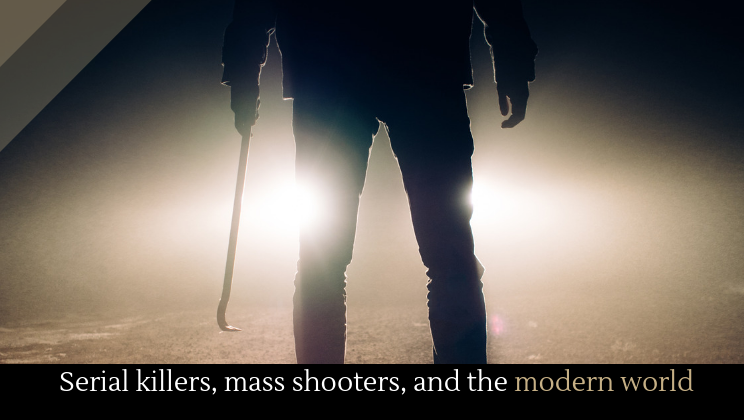Serial killers, mass shooters, and the modern world
Posted by Annie May / January 30, 2019
The term “serial killer” didn’t exist before the 1970s, and it didn’t become popularly used until 1981. Now, forty some years later, we’re obsessed with serial killers. Whether it’s the original Halloween (1978) movie or its reboot this last year, we apparently love feeling afraid of violent murders. We also love watching them, given the amount of blood and gore in those movies.
We also love the psychological aspect of serial killing. The BBC’s The Fall is an incredibly nuanced deep dive into the psychology of a serial killer. Netflix’s Mindhunter tells the story of the invention of criminal profiling and the “discovery” of serial killers. Netflix continues to cash in on our love of serial killers with the release of a new documentary series about a reporter’s interviews with Ted Bundy. That series revealed the true depth, and the true sickness, of our love with serial killers: viewers are calling Ted Bundy sexually attractive. Some may be joking, but there is always a little bit of truth behind a joke.
Kerri Rawson, daughter of the infamous “B.T.K.” serial killer, is also playing into our fascination with serial killers with the release of a book detailing her struggle with the realization that her father was a murderer.
Although serial killers aren’t a new historical phenomenon––think The Devil in the White City or Jack the Ripper––the spike in serial murders in the 1970s and 1980s changed American life. The streets were no longer safe; hitchhiking was inviting disaster. Those who lived through that period might find our strange draw towards serial killers disturbing.
We might compare the rise of serial killers in the 1970s and 1980s to the rise of mass shooters since Columbine. Just this week a man was apprehended after shooting his own family––apparently he did so as revenge for being kicked out of his home. He had been kicked out because he stole $200,000 to pay a cam-girl. Imagine movies and documentaries pouring out about mass shooters. Then imagine fictional TV shows put you in the mind of a mass shooter, shows you his (and they’re nearly always men) actions. Our reactions to such a TV show or movie would be horror, disgust, and anger. But to our children, or our children’s children, the dramatized version of the Columbine shooting, or the Las Vegas shooting, might be high entertainment. Imagine if someone two generations in the future called the Columbine shooter “hot” or “sexy.”
That’s probably going to happen. But why? What accounts for our obsession with such a dark subject?
There are as many answers to that question as there are readers of this piece, I would guess. But I want to suggest one possibility, one rooted in the historical emergence of serial killing in London and Chicago (the killings in those cities were about five years apart). Our love of violence stems, at least in part, from our choice to live in urban spaces and working in highly routinized jobs. Max Weber called that existence life in an “iron cage.” We all live, he says, a horribly trapped existence and we long to escape. What does an animal do when its cornered? It lashes out, violently.
More about TV.
Comments are off for this post.